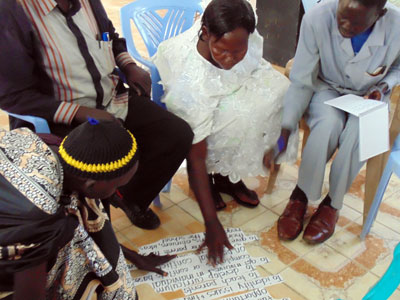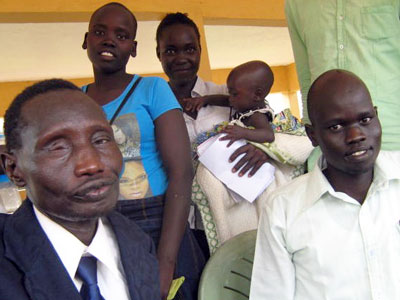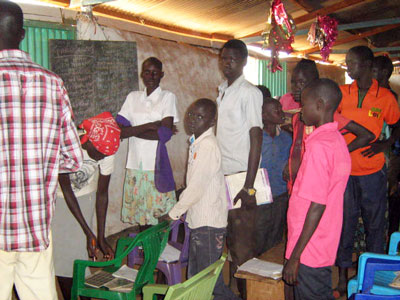A letter from Leisa Wagstaff serving in South Sudan
May 2016
Write to Leisa Wagstaff
Individuals: Give online to E200501 to Leisa Wagstaff’s sending and support
Congregations: Give to D504924 for Leisa Wagstaff’s sending and support
Churches are asked to send donations through your congregation’s normal receiving site (this is usually your presbytery).
Dear Colleagues in Mission,
It almost bordered on giddiness, so excited were the six young people who had gathered for their final orientation session and sendoff. Within 48 hours they would officially begin their journey toward becoming a qualified teacher; more specifically, a teacher having the required skills and knowledge to improve the quality of education in PCOSS schools and their communities. As I basked in their exuberance I envisioned them in classrooms at the Yei Teacher Training College (YTTC) soaking up all the pedagogy imparted by their teachers, sharing rich cultural diversity and experiences with mates from all over South Sudan, searching together for an understanding of what is happening in their homeland, and frantically seeking ideas of how to restore peace—and thus foster an educational environment that changes the dismal statistics of a mere 27 percent adult literacy rate, 36 percent primary school age enrollment, and 10 percent girl child matriculation level.
I know that these students have a lot riding on this opportunity. For South Sudanese, even basic education is not assured, not to mention schooling beyond this point. A scholarship from the South Sudan Education and Peacebuilding Project (SSEPP) is providing these deserving future teachers and community mobilizers an opportunity to step beyond ethnic distrust, conflicting communities, a seemingly never-ending war, gender imbalance (four of the six are female!) and lack of past opportunities. As with the current PC(USA)-sponsored recipients, upon graduation they will represent a diversity of the country and gender, yet working together for a common goal: providing quality education in PCOSS schools.
Their stories of how they got to this point are as varied as the country in which they call home; Rebecca’s no exception. It was her husband who first heard of the SSEPP teacher-training opportunity. In a culture in which girls’ education is not valued, decisions regarding their life are made by males, or they are not even considered as an equal, Rebecca’s husband, though not highly learned, was a great advocate for his wife’s education. He tracked down the application and encouraged his mate to apply.
Rebecca says that her somewhat older husband appreciates her smartness and is not intimidated by it. He also knows that if she has an opportunity, she will develop to her fullest potential. Although first in her primary school classes, a leader during her childhood and active in church and community, Rebecca had to give up her dream of becoming “somebody” when her father died. With no one to encourage or assist her, she felt it was better to get married so that her spouse could help care for her mother. Married at 17 and sharing her family compound with her husband’s two other wives, she says that she respects these women because of their age and experience. “It is my first time to get married.”
Like most citizens, Rebecca has seen her share of loss and trauma. She recalls fleeing after an attack on her village and staying in the bush for three months before reaching a place of resettlement. Just a few months ago bandits attacked her community, leaving a neighbor dead, a community traumatized, and her attestations of community participation and primary school pass certificate missing.
Rebecca’s husband sees his wife’s leaving home for the teacher-training program for months at a time as a contribution to the family’s wellbeing. As he puts it, “When a family member gets sick, someone must be able to read the directions on the medication. Knowledge is power. It equals a job possibility that will lead to a salary and self-help and assistance to the extended family.” During my earlier visit to the community to encourage parents to send their children to school, he pushed for more community involvement and the education of children—both boys and girls. “I will not allow my wife to stay at home. She must get her education. I am not educated but if my wife is educated, she can read for the family and teach our children to read. She can bring development to our family,” he declared.
As the gathered group of students continued to make plans to travel to YTTC together, Rebecca’s nursing baby who will also accompany her on the journey was passed from one pair of arms to another. I could see that each of her new classmates claimed ownership of this child and pledged to do their part in providing the “village” necessary to raise him. They each had forgotten their ethnic grouping or traumatized history and were looking toward the future—as a group. For them, opportunity was the key, not only for one person but for all of them.
At a time when the country is still experiencing clashes and much disagreement abounds as to how the country is to mend and move forward, it is assuring to see young people excited, making plans for the future and trying to equip themselves to move their communities forward. A lengthy text message was received a week later from one of the other SSEPP-funded students stating, “We are having the time of our lives. It is not easy academically, but this is what we have longed for—A CHANCE to see how far we can go. Thank you, Mama Leisa, for believing in us. Thanks, PCOSS Education, for selecting us. Thanks, American Presbyterians, for not forgetting us.”
The six new teachers in training and the eight scheduled to complete their two- and three-year programs of study in December will be a great asset to realizing the goals of the SSEPP. Thanks, as always for helping us in this attainment through your generous spiritual, moral and financial support and advocacy. Continue to journey with the South Sudanese and be a part of OUR ministry here.
In Continuing Service Together,
Leisa Wagstaff
![]() You may freely reuse and distribute this article in its entirety for non-commercial purposes in any medium. Please include author attribution, photography credits, and a link to the original article. This work is licensed under a Creative Commons Attribution-NonCommercial-NoDeratives 4.0 International License.
You may freely reuse and distribute this article in its entirety for non-commercial purposes in any medium. Please include author attribution, photography credits, and a link to the original article. This work is licensed under a Creative Commons Attribution-NonCommercial-NoDeratives 4.0 International License.


